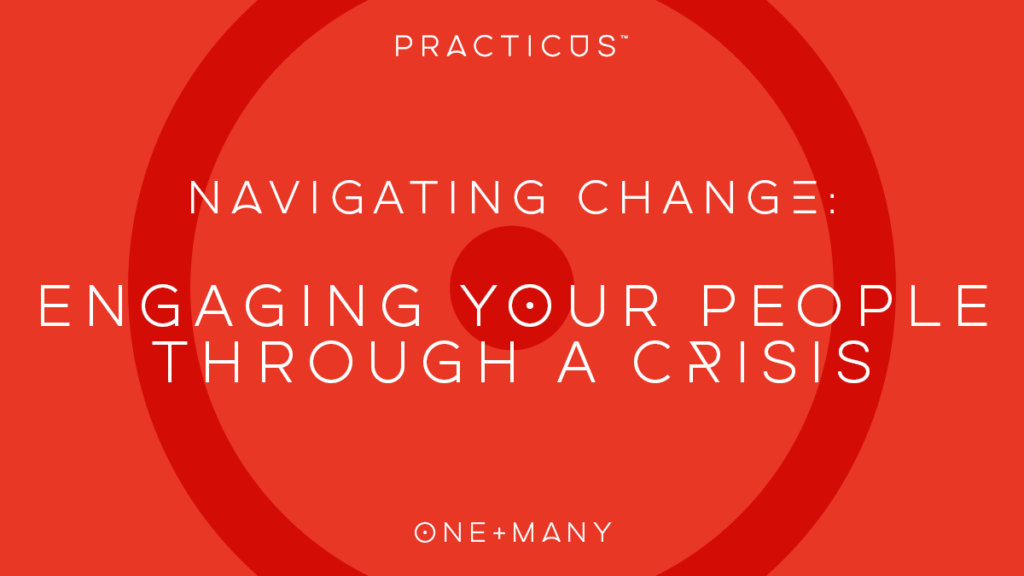Navigating Change: Engaging your People through a Crisis

With COVID-19 having a significant impact on businesses throughout the world, we spoke with Practicus community member, Nik Butcher, an expert in Engaging and Rewarding people and the founder of Chuangyi and SEE Reward.
Nik’s view is that however much we all hope the current COVID-19 situation passes us quickly (and without affecting us or our family, friends and colleagues), all businesses are going to feel some pain throughout this worrying period. For many large businesses, this will be the first time they test their “major disruption” policies. For smaller Companies, there will obviously be major concerns about how they can keep going long enough to get through the current crisis, and how they can best access Governmental support.
But despite all these quite weighty concerns, Nik believes that there is another question that businesses cannot afford to ignore: what effect will this period of uncertainty have on its people? Most importantly, the effect it will have on them when the “all clear” is sounded and they return to work. This may sound like he is getting ahead of himself – a nice problem to have – but there is a serious point here. You could be putting your chances of smoothly returning to your previous levels of success at risk if you’re not engaging all of your people, at whatever level they work for the business, now and throughout the whole period of uncertainty.
Many people are now working remotely; often for the first time. Isolation among your employees will kill their motivation, engagement and identification with their employer and company. To protect your business’s future, here are Nik’s four HR strategy tips that he believes will be most effective in keeping your people engaged with the business, and helping ensure that they return to work with the same enthusiasm, motivation and engagement that you need them to.
Regular Communication with Everyone
Communication has always been key to engaging your people, and whether you ask your people to work remotely, continue to attend their place of work, or even take a period of leave or enforced temporary lay-off, you should still continue to communicate with everyone. With the prevalence of social platforms, such as WhatsApp, Messenger and many others, you can easily create a “group” on one of these platforms where you can continue to talk to your people, individually or en masse, regardless of where they are physically. Using one of these social platforms rather than email will naturally engage your people more effectively and create a more open forum where they can also communicate with each other and with the business.
Ensure Remote Working isn’t “Remote”
Working remotely shouldn’t feel like being isolated, and regular contact is essential in ensuring they continue to feel valued, engaged and part of their team, as well as helping to protect their wellbeing. To follow on from the previous ideas of using social platforms, when starting these calls and video conferences, please first ask how your people are. Chat for a bit, as you would have done over a coffee, or before meetings start, then go on with the business side of the call. Showing interest in your people will help them feel “part of” the business and ensure that they remain engaged.
Gamify Periods of Enforced Absence
Through the closed groups you’ve set up to communicate with your people, you should introduce an element of “Gamification”. Ask them to post photos and video clips of what they’re doing to pass the time, run a baking competition between your people, or send out a weekly “quiz”. Whatever you do to encourage your people to interact with you and retain an element of “fun” when communicating with the business, will help them cope with suddenly, through no fault of their own, not being at work. This will protect both their wellbeing and their engagement levels. the right culture and behaviours from your people, whether they’re at work or not, putting them in good stead for when they return to normal.
Support your People’s Families
Whatever you do for your people, do for their families and loved ones. When you talk to your people and ask how they’re getting on, ask about their relatives too. Depending on your people’s locations, you might be able to offer to pick up essential supplies for them, or even, within your closed group communications, encourage your people to help each other’s relatives who may need more support. Whatever you do, remember that your people don’t only work for themselves; they work to support others. The more you can consider those others throughout this period of crisis, the more your people will show their appreciation of that when they return to work.
If you’re thinking of your own ideas to engage and help your people, feel free to talk to us about these ideas and whether we can help you make them even more effective. Both Practicus and SEE Rewind are offering to help and advise you in any way we can, as we need to work together to ensure that we all come through this in as good a position as possible.
We can’t change the world alone but together we can make a difference.
Find out more about Practicus’s HR and HR Consultancy services.
Behaviour and Culture services
Practicus helps organisations solve challenges around People, Behaviour and Culture.
Find out more about our behaviour and culture services here.